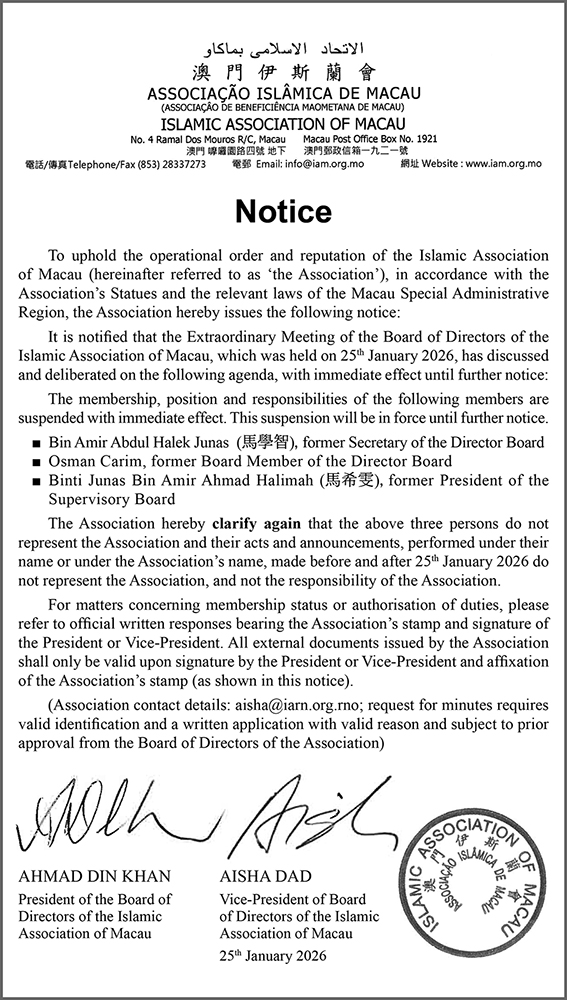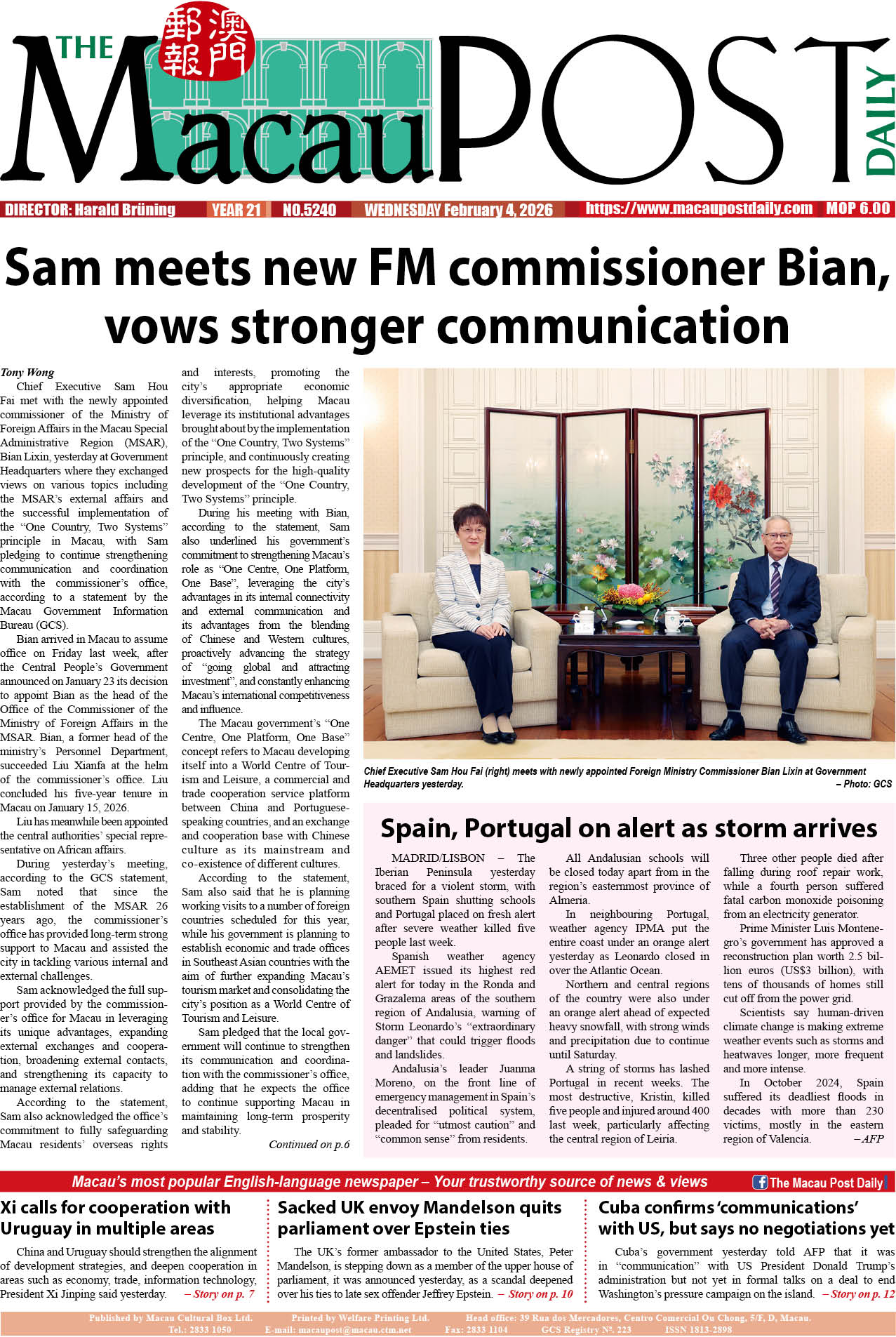Editorial
“Don’t bite the hand that feeds you” is a very useful metaphor, traditionally attributed to Greek poet Sappho (circa 630-570 BC), to describe ingratitude towards one’s benefactor.
I couldn’t avoid remembering this very pertinent, over two-millennia-old piece of advice when hearing about Macau and Hong Kong community leaders’ poorly thought-out comments recently about “too many” tourists, tour groups from the mainland in particular, affecting local residents’ daily lives.
Undoubtedly, tourism is invariably affecting local populations’ lives either way, in Macau, Hong Kong and elsewhere, positively or negatively, be there “too many” or “not enough” tourists. There are long holiday weekends, for instance, when there seems to be “too many” visitors, and there are certain periods of time when, for whatever reason, a tourist destination’s number of visitors is deemed to be “not enough”, such as during Macau’s three-year-long COVID-19 travel curbs. The ideal situation would be the golden mean, i.e., the desirable middle between the two extremes (“too many” vs “not enough”), one of perceived excess and the other of shortage.
Reality is hardly ever ideal so that the golden middle way usually remains a goal that one may strive for but, in the final analysis, is practically unachievable, also because it is a matter of how one would – rather subjectively – define the golden mean.
In Macau’s context, what would be the “ideal” number? A daily average of about 85,000 (such as on Easter Sunday) or nearly 100,000 (such as in December 2019) visitor arrivals, or 22.9 million (such as in 2008) or 31.5 million (such as in 2014).
The perception of the excessive or insufficient number of visitor arrivals has been a matter of debate in Macau for at least two decades. A previous policy secretary even came up with the idea to impose a kind of arrival tax on visitors, in the apparent attempt to keep tourist numbers down. Thank goodness, it never got off the ground.
Tourists from the Chinese mainland, Hong Kong, Taiwan and foreign countries are our benefactors who shouldn’t be penalised for the simple reason that they are keen to visit our city. Without them, people in Macau, its civil servants and tourism- and gaming-related employees in particular, wouldn’t earn the salaries and fringe benefits that they enjoy. In the fourth quarter of last year, employees’ median employment earnings stood at 15,600 patacas, according to official statistics. In the last quarter of 2019 they amounted to 17,000 patacas. I am quite sure that they will soon reach again their pre-pandemic 2019 level – thank you, our dear tourists!
In December 2019, Macau’s daily average of visitor arrivals stood at 99,465. That’s an impressive number for our tiny city that is densely populated to boot (about 20,200 souls per sq. km). However, just for reasons of comparison, it’s quite normal for any major mall in Bangkok to have a post-pandemic customer traffic flow of around 100,000 per day again, Thai friends told me during my recent Chinese New Year visit to the city.
My personal impression, based on anecdotal evidence, is that Macau is quite capable of handling a daily average of 100,000 visitor arrivals a day, or around 35 million a year, provided that public transport is further improved. A major beacon of hope is the ongoing extension of our LRT system. Its future links with Hengqin and the Barrier Gate checkpoint are crucial to smoothen the flow of tourists. I think the government should be bold enough to widen the LRT network even further in the medium term. Bangkok’s network of BTS Skytrain and MRT (underground) lines have proven that public transport can be dramatically improved within a relatively short period of time in spite of difficult topographic conditions.
Improving the local tourism industry’s transport infrastructure is one challenge, the other being its service quality that still leaves much to be desired.
Quite appropriately, gaming and transport executive Pansy Ho Chiu King called last week for the need to upgrade the tourism sector’s service quality.
Tourism in Macau does not just consist of casinos and hotels as well as sightseeing and eating-out but also includes the increasingly important ($$$) shopping segment (jewellery shops, pharmacies, supermarkets, malls, etc.), such as in Hong Kong and Bangkok. That’s why service quality in the retail sector is of utmost importance to the quality of Macau’s tourism industry in general. My personal view is that apart from tertiary education courses Macau should reinforce its vocational training of all those working in tourism – including tour guides, sales assistants, exhibition attendants and, last but not least, waiting staff. And all those courses – academic and vocational – should teach their students one fundamental aspect of tourism: please always smile when dealing with tourists’ occasionally quirky demands. Anyone working in the tourism industry must accept the fact that they are servers – in the most basic meaning of the word.
And people in Macau in general and our community representatives in particular, please do not bite the hand that feeds you. For sure, tourists can be a pain in the rear but, don’t forget, not only do they help you pay your bills but also enable you to raise your living standard bit by bit.
I visited Hong Kong on Easter Eve – my first trip to our neighbouring special administrative region since the easing of COVID-19 travel restrictions – and I was pained when I happened to overhear some local pedestrians making disparaging remarks in Cantonese about a visibly cheerful group of elderly tourists from the mainland, all of them wearing red caps, exploring Central. Luckily enough, they didn’t appear to have heard the slurs. Witnessing the deplorable incident, I would have liked to wear a red cap at that very moment…
– Harald Brüning







